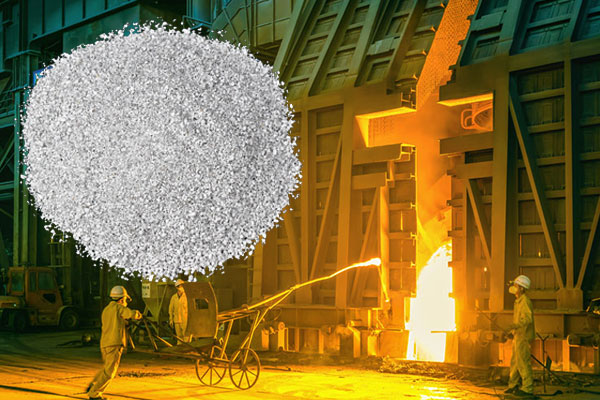Flux for Dunkirk Aluminum is made of a variety of salt compounds by special process. Cast Aluminum Flux is widely used in the aluminum processing industry, the dual purification of aluminum and liquid by gas and flux is realized, and
Cast Aluminum Flux is used to smelt pure aluminum and various commonly used aluminum alloys.
Flux for Dunkirk Aluminum advantages of gas refining and flux refining are combined, the degassing effect is better; the addition amount is small, the operation is simple and convenient, the labor intensity of the worker is reduced. The utilization rate of the refining flux is high, and the degassing, slag removal of aluminum liquid is effectively realized.
Flux for Dunkirk Aluminum Advantages
1. Since this product does not contain sodium, it avoids or reduces the occurrence of white spots on the surface of aluminum and aluminum alloy.
2, good heat, slag aluminum is separated, and decomposes the alumina in the slag, making the aluminum slag dry and loose, easy to remove.
3. After treatment, the purity of the aluminum liquid is greatly improved, the performance of the alloy is improved, and the aluminum consumption is reduced.
4. Reduce the adhesion of slag to the furnace wall and the bottom of the furnace, avoid damage to the furnace body, extend the service life of the aluminum body and reduce the number of furnace cleaning.

Dunkirk Aluminum is the largest primary aluminum smelter in Europe and a valuable industrial asset vital to the French government. In October, the smelter was taken over by private equity firm American Industrial Partners, which cancelled debt held by Liberty Industries France, a division of Sanjeev Gupta’s troubled GFG Alliance.
Due to rising electricity prices, Aluminium Dunkerque Industries France has reduced metal production in the past two weeks. It is equivalent to about 3% of Dunkerque Aluminum’s production capacity. Since the beginning of November, the plant has lost nearly 20 million euros (22.6 million US dollars), and if electricity prices continue to remain high, more power cuts may be required. A second source familiar with these activities confirmed the cut.
Although aluminum prices have risen by more than 40% this year, and demand for the factory’s products is also increasing, the sharp rise in electricity prices in recent weeks has weakened profitability. The electricity required to produce one ton of aluminum was sold at approximately US$2,800 per ton on the London Metal Exchange on Wednesday, and it costs approximately US$11,000 in France based on a one-month base load pricing.
The further reduction in output will depend on the factory’s ability to fulfill its contractual obligations to customers. As we all know, aluminum smelters have been slow to reduce production due to the huge costs of shutting down and restarting production capacity.

